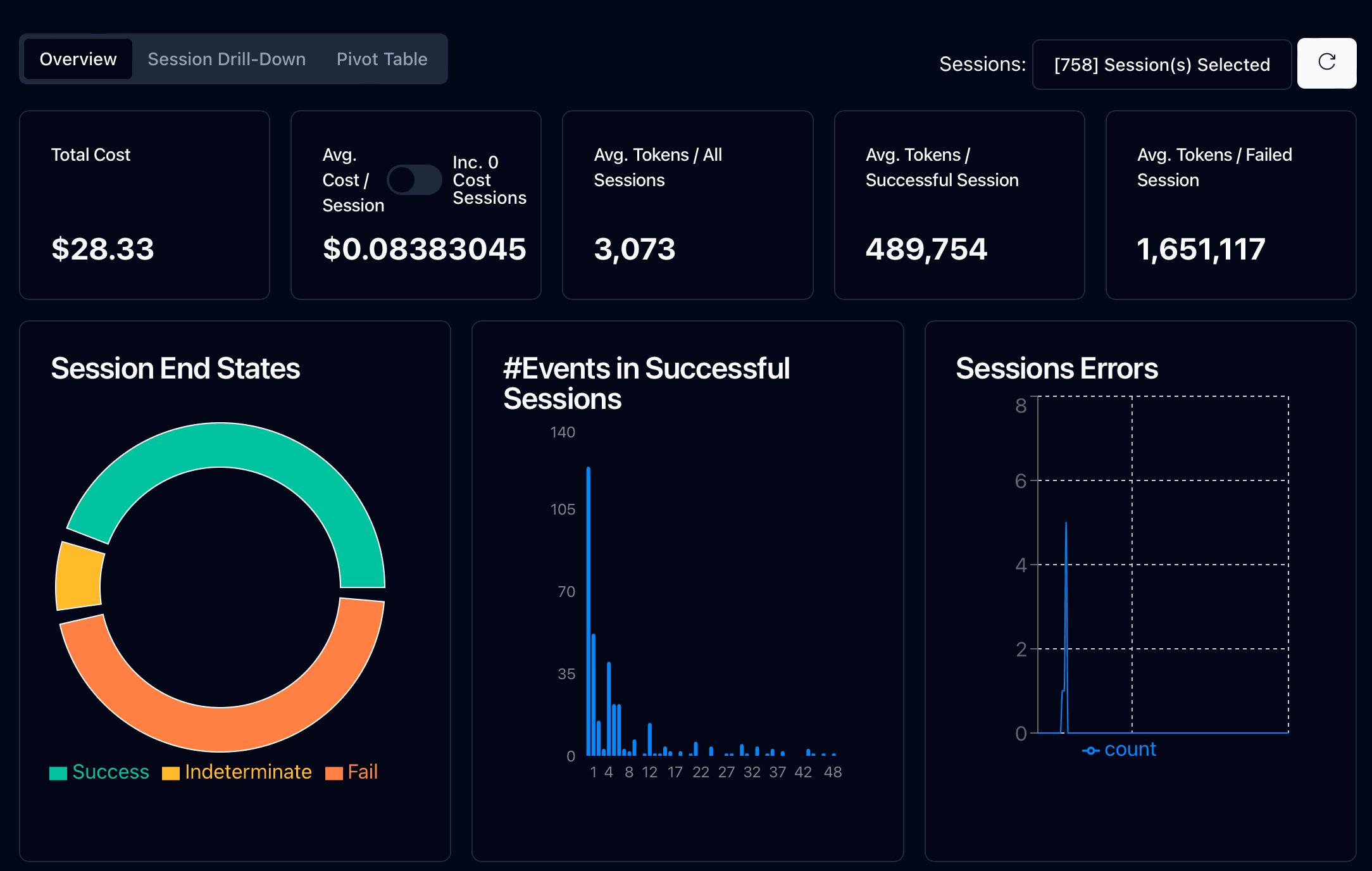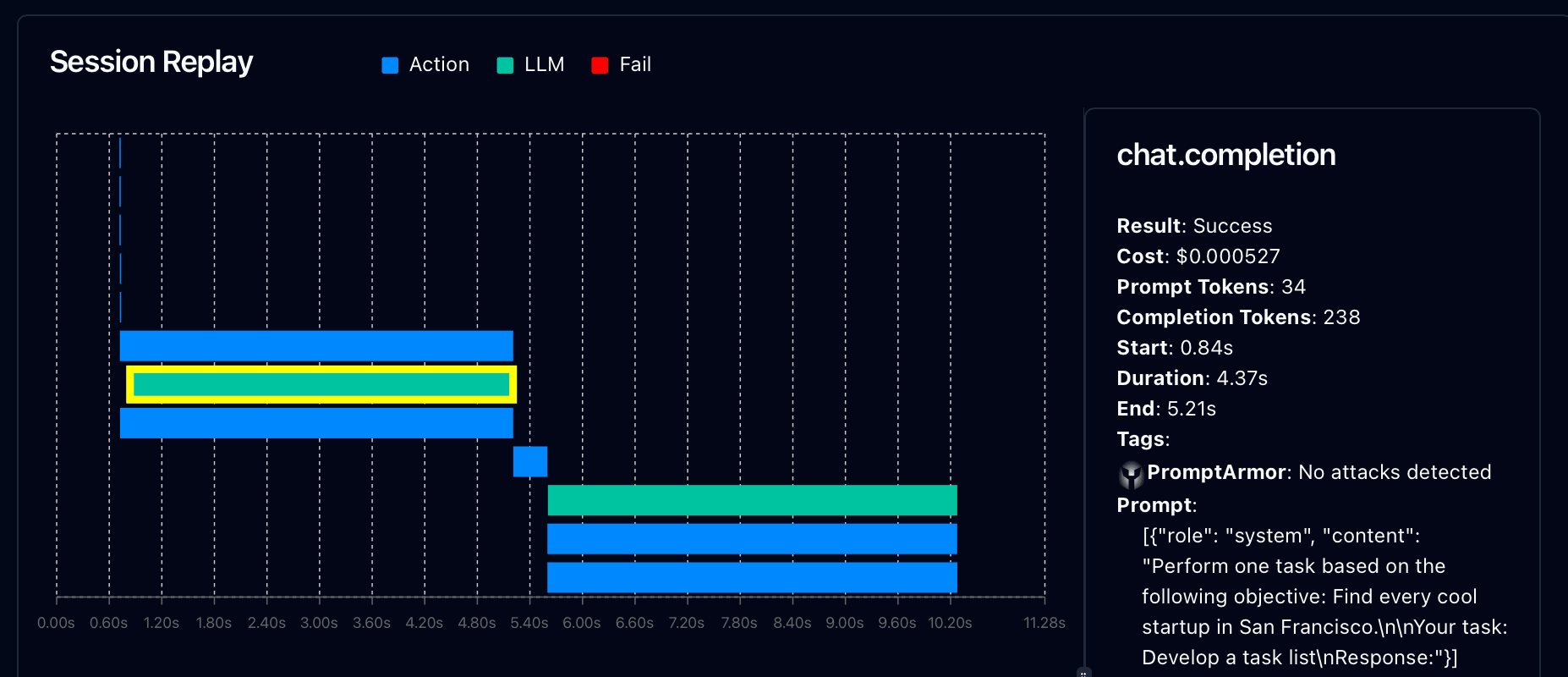How AgentOps Helps in Managing LLM Costs
As AI agents become increasingly prevalent in enterprise solutions, the management of Large Language Model (LLM) costs has emerged as a critical concern for developers and businesses alike. LLMs, while powerful, can be expensive to operate, especially at scale. The growing importance of LLM cost management in AI agent development cannot be overstated, as it directly impacts the feasibility and sustainability of AI projects.
Tracking and optimizing LLM usage presents several challenges. Developers must navigate the complex landscape of token consumption, balancing the need for sophisticated AI capabilities with budget constraints. Moreover, the dynamic nature of AI agent interactions makes it difficult to predict and control costs effectively. These challenges underscore the need for robust tools and strategies to manage LLM expenses while maintaining high-performance AI agents.
AgentOps’ Comprehensive LLM Cost Management Features
AgentOps offers a suite of powerful features designed to address the complexities of LLM cost management. At the heart of these capabilities is real-time tracking of token usage and spend. This feature allows developers to monitor costs as they occur, providing immediate visibility into how AI agents are consuming LLM resources. By offering this level of granularity, AgentOps empowers developers to make informed decisions about resource allocation and optimization in real-time.
The analytics dashboard for cost monitoring is another key component of AgentOps’ LLM cost management toolkit. This intuitive interface presents high-level statistics and metrics about agents in both development and production environments. Developers can easily track costs, token counts, latency, and success/failure rates, gaining a comprehensive view of their AI agents’ performance and economic impact.
One of AgentOps’ most valuable features is its automatic instrumentation of popular LLM providers. After a simple initialization process, AgentOps seamlessly integrates with providers like OpenAI, Cohere, and LiteLLM. This automation significantly reduces the burden on developers, allowing them to capture detailed cost and usage data on LLM calls without additional effort. The result is a more streamlined development process and more accurate cost tracking.

Detailed Cost Analysis and Optimization
AgentOps goes beyond basic cost tracking by offering in-depth analysis tools for optimization. The platform provides session drilldowns and replays, offering granular cost insights into each AI agent interaction. Developers can examine step-by-step details of agent execution, including specific LLM prompts, completions, token usage, and associated costs. This level of detail is invaluable for identifying areas of inefficiency and opportunities for cost reduction.
Identifying inefficient LLM calls and usage patterns is crucial for optimizing costs. AgentOps’ analytics tools help developers pinpoint instances where AI agents may be overusing LLM resources or making unnecessary calls. By highlighting these inefficiencies, AgentOps enables developers to refine their agent designs and prompts for more cost-effective operation.
AgentOps also provides strategies for reducing token consumption, a key factor in managing LLM costs. The platform offers recommendations based on usage patterns, suggesting ways to fine-tune prompts and optimize agent interactions. These strategies might include techniques for more efficient prompt engineering, better context management, or smarter caching of LLM responses. By implementing these optimizations, developers can significantly reduce their LLM costs without compromising agent performance.

Integration with AI Agent Frameworks
AgentOps’ power in managing LLM costs is amplified by its seamless integration with popular AI agent frameworks. This integration allows developers to monitor and optimize costs across various agent architectures without disrupting their existing workflows.
AgentOps provides built-in cost monitoring capabilities for several key frameworks:
CrewAI: Ideal for multi-agent systems where LLM usage can quickly accumulate
AutoGen: Enables cost tracking for automated AI agent interactions
LangChain: Offers cost insights for language model chains and applications
Key benefits of AgentOps’ framework integration include:
Minimal setup required for instant visibility into LLM costs
Tracking of costs across all agents in a system or crew
Identification of resource-intensive agents or interactions
Cross-framework visibility for better resource allocation
Informed decision-making about framework selection for specific tasks
By simplifying cost management across different agent architectures, AgentOps empowers developers to choose the most cost-effective solutions for their AI agent applications. This integration is crucial for organizations looking to optimize their AI investments across various platforms and use cases.
Balancing Performance and Cost in AI Agent Development
One of the most challenging aspects of AI agent development is striking the right balance between performance and cost. AgentOps provides tools to help developers navigate this complex trade-off.
AgentOps offers insights into the correlation between token usage and agent performance. By analyzing this relationship, developers can identify the sweet spot where increased token usage no longer yields significant performance improvements. This understanding is crucial for optimizing AI agents to deliver maximum value at minimum cost.
A/B testing for cost-performance optimization is another powerful feature of AgentOps. Developers can run parallel tests with different agent configurations, prompting strategies, or model choices to determine which approach offers the best performance-to-cost ratio. This data-driven method takes the guesswork out of optimization, allowing for evidence-based decision-making in agent development.
Setting and managing budget thresholds is a critical aspect of LLM cost management that AgentOps simplifies. Developers can establish cost limits for individual agents, projects, or entire AI systems. AgentOps provides real-time alerts when these thresholds are approached or exceeded, enabling proactive cost control. This feature is particularly valuable for enterprises working with fixed AI budgets or those seeking to gradually scale their AI operations.
Security and Compliance in LLM Cost Management
As AI agents handle increasingly sensitive tasks and data, security and compliance in cost management become paramount. AgentOps addresses these concerns head-on, ensuring that cost tracking doesn’t compromise data privacy or regulatory compliance.
Ensuring data privacy in cost tracking is a core principle of AgentOps. The platform is designed to capture cost-related metrics without exposing sensitive information contained in prompts or responses. This separation allows for comprehensive cost management without risking data breaches or violating privacy policies.
For enterprises operating in regulated industries, compliance with financial regulations is crucial. AgentOps helps navigate these complex requirements by providing detailed audit trails of LLM usage and associated costs. These records can be invaluable for demonstrating responsible AI spending and adhering to financial reporting standards.
Moreover, AgentOps’ compliance features extend to data protection regulations like GDPR and HIPAA. The platform ensures that cost tracking and optimization processes align with these stringent data handling requirements, giving enterprises the confidence to deploy AI agents in sensitive environments without compromising on cost management capabilities.
Empowering Cost-Effective AI Agent Development
AgentOps stands as a pivotal tool in the evolving landscape of AI agent development, offering a comprehensive solution for managing LLM costs without compromising performance or security. By providing real-time cost tracking, detailed analytics, and seamless integration with popular frameworks like CrewAI and AutoGen, AgentOps empowers developers to make informed decisions about resource allocation and optimization.
The platform’s ability to balance performance with cost-effectiveness, coupled with robust security and compliance features, makes it a valuable asset for enterprises seeking to leverage AI agents sustainably. As AI continues to transform industries, AgentOps ensures that organizations can harness the full potential of LLMs while maintaining control over their budgets, paving the way for more efficient, cost-effective, and responsible AI agent deployment.






